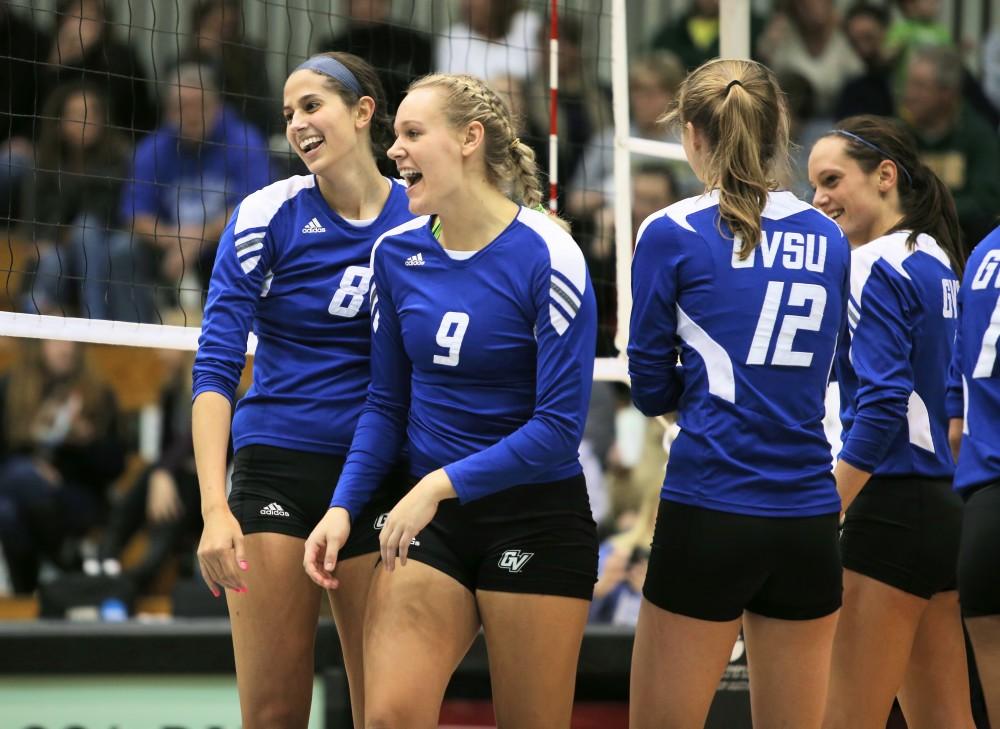GVSU athlete takes part in Rose Bowl Parade

GVL/Kevin Sielaff #8 Ally Simmons and #9 Clair Ruhenkamp
Jan 5, 2015
For every inspiring story in the realm of collegiate athletics, there are two that go untold. Recognition is typically reserved for those who excel in the starting lineup.
That’s where Clair Ruhenkamp’s four-year career with the Grand Valley State University volleyball team began. Ruhenkamp was GVSU’s starting setter in her first two seasons, but, as a junior, she lost her starting spot for good to a standout transfer who played the same position.
Ruhenkamp was left with two choices: quit the team or accept her new role as the team’s practice-squad setter. She chose the latter, and later wrote an essay about the experience that earned her a $5,000 scholarship to continue her education.
Northwestern Mutual, the presenting sponsor of the 2014 Rose Bowl Game, selected seven “Inspiring Stories” from NCAA athletes who have achieved greatness by overcoming adversity. The athletes were not only awarded the scholarship, but also a chance to ride on the company’s float (“Inspiring Potential”) in the Tournament of Roses Rose Parade prior to the Florida State-Oregon national semifinal football game on Jan. 1 in Pasadena, Calif.
“Her story gives you chills,” said Paul Barthelemy, the assistant director of brand and advertising at Northwestern Mutual. “It is the ultimate test of someone finding their true meaning and being inspired to reach a different level of potential than they thought they were going to.”
Ruhenkamp found herself in GVSU’s starting lineup for 22 of 27 matches as a freshman and all 33 contests as a sophomore, earning back-to-back All-GLIAC Honorable Mention laurels in the process. In just two seasons, she racked up the eighth-most assists in program history (1,912).
Her role on the team would never be the same. In 2013, Kaitlyn Wolters transferred to GVSU, won the starting job and earned a number of accolades in the next two seasons (including GLIAC Player of the Year) while GVSU put together a two-year record of 58-10.
Ruhenkamp wrote about the start of her junior season in the essay:
“Fall approached and when our first game came along, I wasn’t in the lineup. I was shocked and felt as if I had just been kicked right in the gut. I stood on the sidelines the entire game, holding back tears of confusion, anger, and disappointment. The transfer setter had an amazing game and at that point I knew that she had just become GVSU’s starting setter.
“I remember going back to my house that night and calling my parents. I never had to sit on the bench before and I wasn’t sure if I could do it and still be a good teammate. After talking to my parents many times, I decided that I was going to find the positives, take on whatever role the team needed me to take, and do it to the very best of my ability (while, of course, also still trying to fight my way back to the starting role). I decided that if the coaches needed me to be the ‘practice’ setter, I was going to do everything in my ability to push my teammates on both sides of the net and make our team better.”
To GVSU coach Deanne Scanlon, Ruhenkamp did just that.
While the starters spearheaded the team’s run to the NCAA Final Four in December, many of the reserves played a key role. For Scanlon, the leadership and volleyball IQ provided by the practice-squad setter – or quarterback – sped the progression of GVSU’s younger players.
“We were able to go to our bench so much this year,” Scanlon said. “Those people being able to come in and contribute are a direct result of how Clair performed at practice.
“She set such a good example to everyone of how important it is for everyone to accept what role you’re given. It was emotional for her. She’s a competitor; she’s always been on the court and has been a winner. Yet she was able to come to terms, work herself to understanding how important of a role she could play. She turned her attention toward how could she contribute and best help this team to be successful. It’s a hard thing to do.”
Ruhenkamp, who majors in elementary education and plans to graduate in April, wrote that the four-year journey helped her “become a better teacher, coach and person.” It also helped her learn that “it’s not about being the best – it’s about being better than you were before.”
“We don’t always take the time to understand the hard work, how hard it is to be a great teammate and come to practice everyday and not get the glory of playing in game time,” Ruhenkamp said. “I hope after this essay it helps some other people see that.”

























